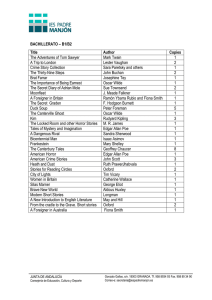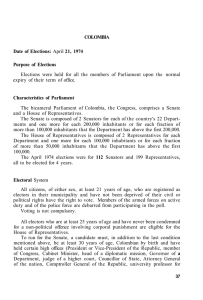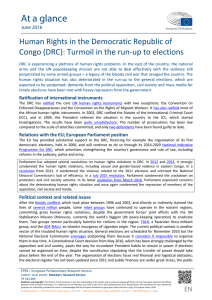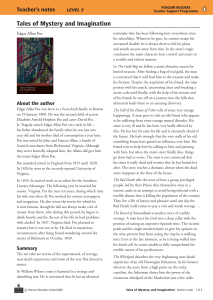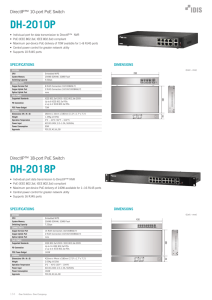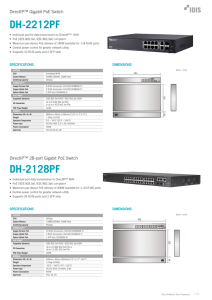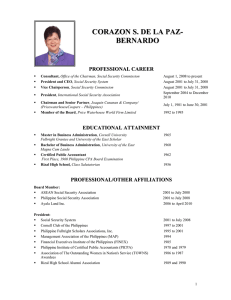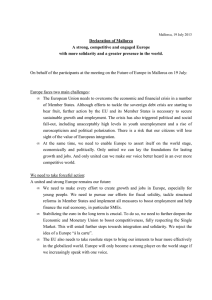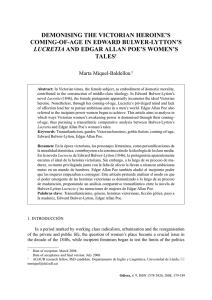Briefing European Parliamentary Research Service
Anuncio
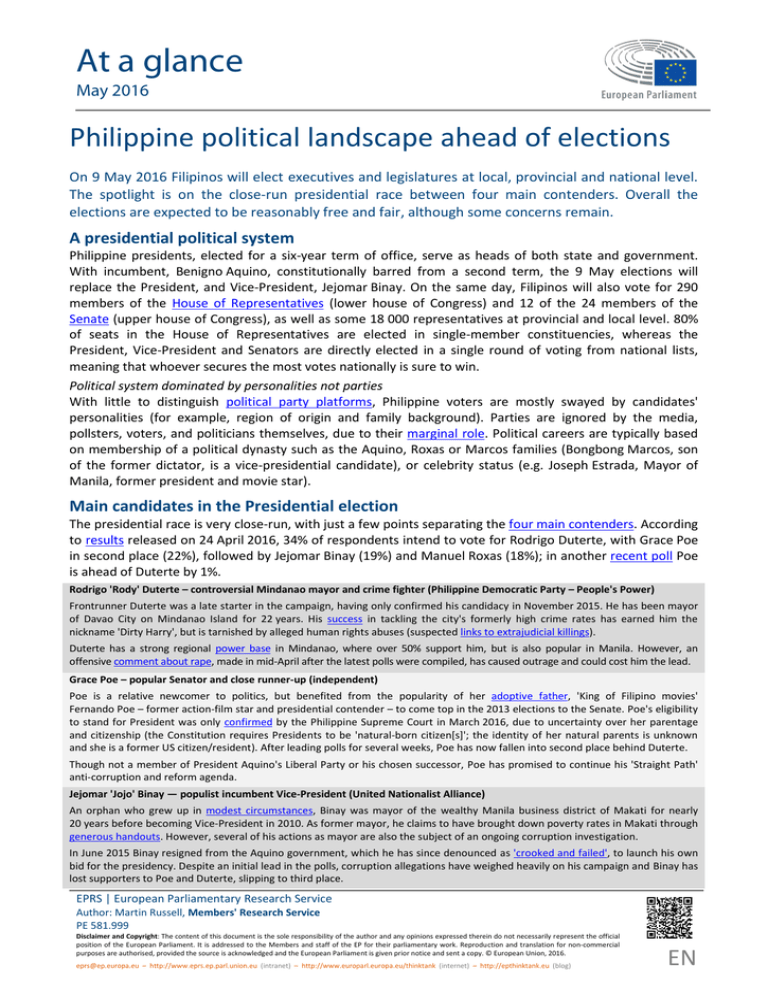
At a glance May 2016 Philippine political landscape ahead of elections On 9 May 2016 Filipinos will elect executives and legislatures at local, provincial and national level. The spotlight is on the close-run presidential race between four main contenders. Overall the elections are expected to be reasonably free and fair, although some concerns remain. A presidential political system Philippine presidents, elected for a six-year term of office, serve as heads of both state and government. With incumbent, Benigno Aquino, constitutionally barred from a second term, the 9 May elections will replace the President, and Vice-President, Jejomar Binay. On the same day, Filipinos will also vote for 290 members of the House of Representatives (lower house of Congress) and 12 of the 24 members of the Senate (upper house of Congress), as well as some 18 000 representatives at provincial and local level. 80% of seats in the House of Representatives are elected in single-member constituencies, whereas the President, Vice-President and Senators are directly elected in a single round of voting from national lists, meaning that whoever secures the most votes nationally is sure to win. Political system dominated by personalities not parties With little to distinguish political party platforms, Philippine voters are mostly swayed by candidates' personalities (for example, region of origin and family background). Parties are ignored by the media, pollsters, voters, and politicians themselves, due to their marginal role. Political careers are typically based on membership of a political dynasty such as the Aquino, Roxas or Marcos families (Bongbong Marcos, son of the former dictator, is a vice-presidential candidate), or celebrity status (e.g. Joseph Estrada, Mayor of Manila, former president and movie star). Main candidates in the Presidential election The presidential race is very close-run, with just a few points separating the four main contenders. According to results released on 24 April 2016, 34% of respondents intend to vote for Rodrigo Duterte, with Grace Poe in second place (22%), followed by Jejomar Binay (19%) and Manuel Roxas (18%); in another recent poll Poe is ahead of Duterte by 1%. Rodrigo 'Rody' Duterte – controversial Mindanao mayor and crime fighter (Philippine Democratic Party – People's Power) Frontrunner Duterte was a late starter in the campaign, having only confirmed his candidacy in November 2015. He has been mayor of Davao City on Mindanao Island for 22 years. His success in tackling the city's formerly high crime rates has earned him the nickname 'Dirty Harry', but is tarnished by alleged human rights abuses (suspected links to extrajudicial killings). Duterte has a strong regional power base in Mindanao, where over 50% support him, but is also popular in Manila. However, an offensive comment about rape, made in mid-April after the latest polls were compiled, has caused outrage and could cost him the lead. Grace Poe – popular Senator and close runner-up (independent) Poe is a relative newcomer to politics, but benefited from the popularity of her adoptive father, 'King of Filipino movies' Fernando Poe – former action-film star and presidential contender – to come top in the 2013 elections to the Senate. Poe's eligibility to stand for President was only confirmed by the Philippine Supreme Court in March 2016, due to uncertainty over her parentage and citizenship (the Constitution requires Presidents to be 'natural-born citizen[s]'; the identity of her natural parents is unknown and she is a former US citizen/resident). After leading polls for several weeks, Poe has now fallen into second place behind Duterte. Though not a member of President Aquino's Liberal Party or his chosen successor, Poe has promised to continue his 'Straight Path' anti-corruption and reform agenda. Jejomar 'Jojo' Binay — populist incumbent Vice-President (United Nationalist Alliance) An orphan who grew up in modest circumstances, Binay was mayor of the wealthy Manila business district of Makati for nearly 20 years before becoming Vice-President in 2010. As former mayor, he claims to have brought down poverty rates in Makati through generous handouts. However, several of his actions as mayor are also the subject of an ongoing corruption investigation. In June 2015 Binay resigned from the Aquino government, which he has since denounced as 'crooked and failed', to launch his own bid for the presidency. Despite an initial lead in the polls, corruption allegations have weighed heavily on his campaign and Binay has lost supporters to Poe and Duterte, slipping to third place. EPRS | European Parliamentary Research Service Author: Martin Russell, Members' Research Service PE 581.999 Disclaimer and Copyright: The content of this document is the sole responsibility of the author and any opinions expressed therein do not necessarily represent the official position of the European Parliament. It is addressed to the Members and staff of the EP for their parliamentary work. Reproduction and translation for non-commercial purposes are authorised, provided the source is acknowledged and the European Parliament is given prior notice and sent a copy. © European Union, 2016. [email protected] – http://www.eprs.ep.parl.union.eu (intranet) – http://www.europarl.europa.eu/thinktank (internet) – http://epthinktank.eu (blog) EN EPRS Philippine political landscape ahead of elections Manuel 'Mar' Roxas – political insider and anointed successor to incumbent President Aquino (Liberal Party) A scion of the wealthy Roxas family; Roxas' grandfather was President after World War II. He has had a lengthy career in government, including as Secretary of the Interior in the current administration. Strengths include political experience and his status as President Aquino's chosen successor, although he has also been blamed for the government's performance in some areas (for example, a poor response to typhoon Yolanda in 2013). His privileged background and perceived aloofness from the poor have alienated voters, though he remains popular in his home region of the Visayas. Election issues Economy. For many years, the Philippines lagged behind the rest of south-east Asia. However, solid growth and increased investment to renew the Philippines' decrepit infrastructure are among the outgoing government's achievements. Both Binay and Poe are calling for even greater efforts (Poe: a target of 7% GDP on infrastructure, up from the current target of 5%). Duterte is calling for more investment in regional development (e.g. new railways on his home island of Mindanao). While all candidates have pledged to tackle widespread poverty affecting one quarter of the population, polls show stronger support for Poe among the nation's poor, and for Duterte among the middle classes. Mindanao peace process. In 2013 the government signed a peace agreement with Muslim rebels to end a decades-long insurgency on Mindanao Island. The agreement would give Muslim-majority areas greater autonomy, but implementation remains blocked in Congress. Roxas has promised to go ahead with the agreement as it stands, Binay and Poe challenge provisions, such as a separate police force for the region, as unconstitutional, whereas Duterte would like to see wider reforms with federalism for the whole country. Meanwhile, sporadic outbreaks of violence, including terrorist attacks by ISIL/Da'esh-affiliated group Abu Sayyaf (who are not parties to the agreement, but have benefited from regional instability), continue. South China Sea. In 2013 the Philippines took its territorial dispute with China over the Spratly Islands to a United Nations court. The country has also responded to growing Chinese assertiveness by seeking closer defence ties with the United States (a March 2016 agreement granting the US military access to Philippine bases) and Japan. Both Poe and Roxas support continuation of this line. Binay and Duterte advocate a more conciliatory approach including bilateral talks, as proposed by China, rather than international arbitration. Free and fair elections? There are multiple issues which could affect the outcome of elections, especially if the results are close: Electoral fraud. To combat widespread fraud, the elections will use automatic voting machines instead of paper voting, with biometric registration of voters (photograph, signature and fingerprints). However, there are problems. 2.4 million voters (4% of the electorate) will be disenfranchised for not having registered their biometrics in time. Opponents of automated voting allege that the machines have not been tested properly and are prone to hacking, though election officials deny this. Violence. With nearly 4 million guns in circulation, Philippine elections are often marred by violence, though this has declined in recent years, from 176 election-related deaths in 2010 to 54 in 2013. An extra 10 000 police officers are being recruited in 2016 to enforce a firearms ban during the election period. Media freedom. Journalists are also frequently affected by violence. However, the country's media express a wide range of political views, and there is no evidence of significant bias in coverage of the current elections. Globally, a positive picture. Despite concerns, observers of previous elections such as the Carter Center and Philippines-based Active Citizenship Foundation have been positive overall, raising hopes that these elections will also be reasonably credible. EU-Philippines relations. In 2011, the Philippines signed a Partnership and Cooperation Agreement with the EU; this has not yet been ratified, and is the subject of an EP resolution due to be adopted in June 2016. EU-Philippine trade represents a mere 6% of total EU-ASEAN trade, a much smaller share than Vietnam or Thailand; however, EU imports from the Philippines have been boosted by lower tariffs since 2014. Philippine views remain divided on the benefits of a free trade agreement with the EU, under negotiation since December 2015, with some concerns over the impact on the country's fisheries and agriculture. Candidates have not taken a position on the issue; however, Poe has come out in favour of free trade pacts in general, whereas Roxas is more sceptical, e.g. on the Trans-Pacific Partnership. Members' Research Service Page 2 of 2
